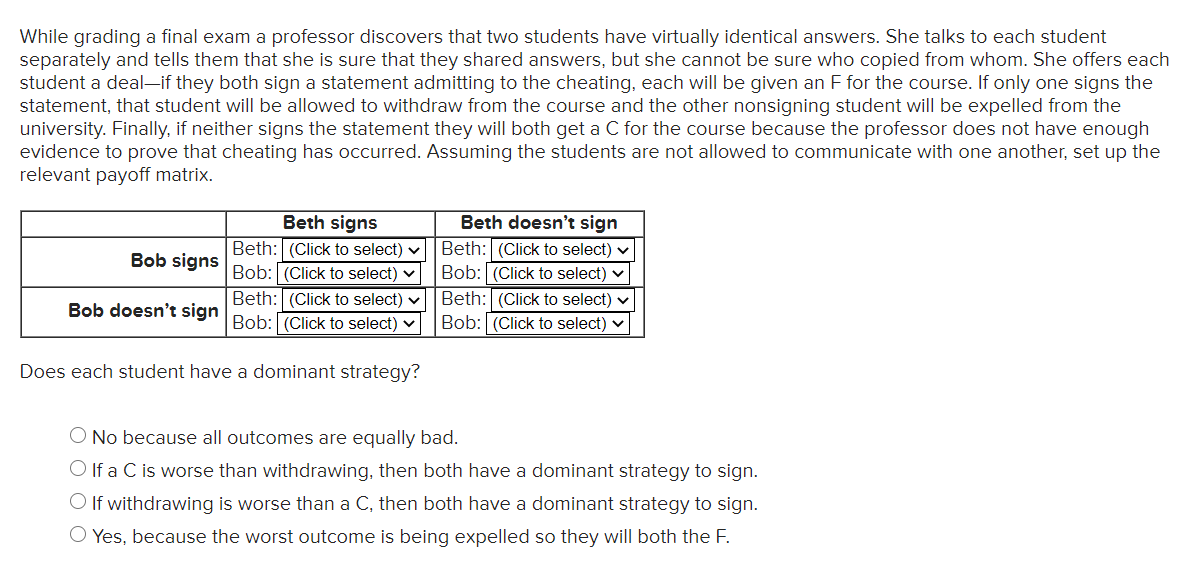While grading a final exam a professor discovers that two students have virtually identical answers. She talks to each student separately and tells them that she is sure that they shared answers, but she cannot be sure who copied from whom. She offers each student a deal-if they both sign a statement admitting to the cheating, each will be given an F for the course. If only one signs the statement, that student will be allowed to withdraw from the course and the other nonsigning student will be expelled from the university. Finally, if neither signs the statement they will both get a C for the course because the professor does not have enough evidence to prove that cheating has occurred. Assuming the students are not allowed to communicate with one another, set up the relevant payoff matrix. Beth signs Beth doesn't sign Beth: (Click to select) v Bob: (Click to select) v Beth: (Click to select) v Bob: (Click to select) v Beth: (Click to select) v|Beth: (Click to select) v Bob: (Click to select) v Bob signs Bob doesn't sign Bob: (Click to select) v Does each student have a dominant strategy? O No because all outcomes are equally bad. O If a C is worse than withdrawing, then both have a dominant strategy to sign. O If withdrawing is worse than a C, then both have a dominant strategy to sign. O Yes, because the worst outcome is being expelled so they will both the F.
While grading a final exam a professor discovers that two students have virtually identical answers. She talks to each student separately and tells them that she is sure that they shared answers, but she cannot be sure who copied from whom. She offers each student a deal-if they both sign a statement admitting to the cheating, each will be given an F for the course. If only one signs the statement, that student will be allowed to withdraw from the course and the other nonsigning student will be expelled from the university. Finally, if neither signs the statement they will both get a C for the course because the professor does not have enough evidence to prove that cheating has occurred. Assuming the students are not allowed to communicate with one another, set up the relevant payoff matrix. Beth signs Beth doesn't sign Beth: (Click to select) v Bob: (Click to select) v Beth: (Click to select) v Bob: (Click to select) v Beth: (Click to select) v|Beth: (Click to select) v Bob: (Click to select) v Bob signs Bob doesn't sign Bob: (Click to select) v Does each student have a dominant strategy? O No because all outcomes are equally bad. O If a C is worse than withdrawing, then both have a dominant strategy to sign. O If withdrawing is worse than a C, then both have a dominant strategy to sign. O Yes, because the worst outcome is being expelled so they will both the F.
Principles of Microeconomics (MindTap Course List)
8th Edition
ISBN:9781305971493
Author:N. Gregory Mankiw
Publisher:N. Gregory Mankiw
Chapter17: Oligopoly
Section: Chapter Questions
Problem 9PA
Related questions
Question
100%

Transcribed Image Text:While grading a final exam a professor discovers that two students have virtually identical answers. She talks to each student
separately and tells them that she is sure that they shared answers, but she cannot be sure who copied from whom. She offers each
student a deal-if they both sign a statement admitting to the cheating, each will be given an F for the course. If only one signs the
statement, that student will be allowed to withdraw from the course and the other nonsigning student will be expelled from the
university. Finally, if neither signs the statement they will both get a C for the course because the professor does not have enough
evidence to prove that cheating has occurred. Assuming the students are not allowed to communicate with one another, set up the
relevant payoff matrix.
Beth doesn't sign
Beth signs
Beth: (Click to select) v
Bob: (Click to select) v
Beth: (Click to select)
Bob: (Click to select) v
Bob signs
Beth: (Click to select) v
Bob doesn't sign Bob: (Click to select) ♥
Beth: (Click to select) v
Bob: (Click to select) v
Does each student have a dominant strategy?
O No because all outcomes are equally bad.
O If a C is worse than withdrawing, then both have a dominant strategy to sign.
O If withdrawing is worse than a C, then both have a dominant strategy to sign.
O Yes, because the worst outcome is being expelled so they will both the F.
Expert Solution
This question has been solved!
Explore an expertly crafted, step-by-step solution for a thorough understanding of key concepts.
This is a popular solution!
Trending now
This is a popular solution!
Step by step
Solved in 2 steps

Knowledge Booster
Learn more about
Need a deep-dive on the concept behind this application? Look no further. Learn more about this topic, economics and related others by exploring similar questions and additional content below.Recommended textbooks for you

Principles of Microeconomics (MindTap Course List)
Economics
ISBN:
9781305971493
Author:
N. Gregory Mankiw
Publisher:
Cengage Learning

Managerial Economics: Applications, Strategies an…
Economics
ISBN:
9781305506381
Author:
James R. McGuigan, R. Charles Moyer, Frederick H.deB. Harris
Publisher:
Cengage Learning


Principles of Microeconomics (MindTap Course List)
Economics
ISBN:
9781305971493
Author:
N. Gregory Mankiw
Publisher:
Cengage Learning

Managerial Economics: Applications, Strategies an…
Economics
ISBN:
9781305506381
Author:
James R. McGuigan, R. Charles Moyer, Frederick H.deB. Harris
Publisher:
Cengage Learning


Managerial Economics: A Problem Solving Approach
Economics
ISBN:
9781337106665
Author:
Luke M. Froeb, Brian T. McCann, Michael R. Ward, Mike Shor
Publisher:
Cengage Learning

Principles of Economics 2e
Economics
ISBN:
9781947172364
Author:
Steven A. Greenlaw; David Shapiro
Publisher:
OpenStax